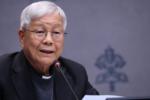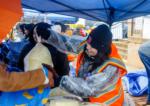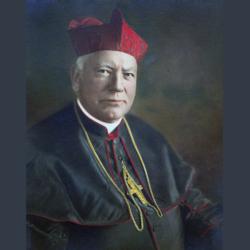Cardinal Becciu, five others sentenced to prison at Vatican trial
VATICAN CITY (CNS) -- The Vatican City State criminal court sentenced Cardinal Angelo Becciu to five years and six months in prison on two counts of embezzlement and one of aggravated fraud but found him not guilty of abuse of office or witness tampering.
The 75-year-old cardinal's attorney, Fabio Veglione, told reporters his client would appeal.
The three-judge panel of the Vatican court handed down the verdicts late Dec. 16. In addition to Cardinal Becciu, five other people were sentenced to jail time ranging from three years to seven years and were ordered to pay the Vatican millions of dollars in damages.
Pending appeal, none of the six people given jail terms were taken into custody.
Only one of the 10 defendants, Msgr. Mauro Carlino, the former secretary of then-Archbishop Becciu when he served as "sostituto," the No. 3 position in the Vatican Secretariat of State, was found not guilty of all charges.
Enrico Crasso, a long-time investment manager who often worked with the Vatican, received the stiffest sentence: seven years in jail.
René Brülhart and Tommaso di Ruzza, respectively former president and former director of the Vatican's financial watchdog agency, now known as the Supervisory and Financial Information Authority, were "absolved" of the charge of abuse of office but were found guilty of negligence for not reporting a suspect financial operation. They each were fined 1,750 euros ($1,900).
The trial revolved around the Vatican's investment in a property in London's chic Chelsea district. But the way the deal was structured and restructured ended up costing the Vatican as much as $200 million. Cardinal Becciu was the No. 3 official at the Vatican Secretariat of State when the property deal, using money invested by the secretariat, was first made in 2014.
The cardinal and three others -- Raffaele Mincione, Fabrizio Tirabassi and Enrico Crasso -- were found guilty of embezzlement for taking $200.5 million from the Secretariat of State's investment fund -- a third of the entire fund -- and investing it with Athena Capital Commodities.
The court described the fund as being "highly speculative" and risky, which violated Vatican guidelines and canon law on the use of church funds.
Mincione, who ran Athena Capital, was found guilty of money laundering for using the Vatican funds to buy the London property, but the court said Cardinal Becciu, Tirabassi and Crasso were not responsible for the London property disaster because they had no control over the money once it was invested with Athena.
The cardinal also was accused of embezzling money that he gave to a Caritas project run by his brother in Sardinia and for aggravated fraud for giving more than 570,000 euros of Vatican money to a woman named Cecilia Marogna, who claimed she could help win the release of a nun kidnapped in Mali.
Marogna was found guilty of being complicit in the aggravated fraud and was sentenced to three years and nine months in jail.
Nicola Squillace, a Milan-based lawyer who helped broker the London property deal, was given a 22-month suspended sentence.
The Vatican tribunal said it would confiscate the equivalent of about $181 million from those found guilty and ordered them to pay another $218 million in damages to the Secretariat of State, the Vatican bank, the Administration of the Patrimony of the Holy See, and Supervisory and Financial Information Authority.
The verdicts were announced two and a half years after the trial began; 86 courts sessions were held with more than 600 hours of testimony by some 69 witnesses. Hundreds of thousands of pages of documents, emails, text messages and transcripts of phone conversations were entered into evidence.
All together, 10 people and four companies had been charged with 49 crimes including bribery, embezzlement, abuse of office, money laundering, fraud and, in Cardinal Becciu's case, witness tampering, a charge for which the court said it found no evidence.
In April 2021, the pope updated the laws governing the Vatican's civil judicial system, stating that cardinals and bishops accused of a crime could be tried in a Vatican court, which, as it turned out, paved the way for the indictment three months later against Cardinal Becciu.


















